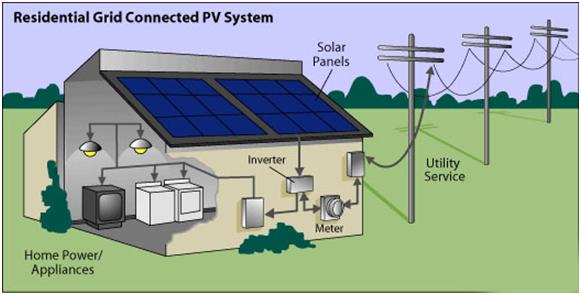GO SOLAR AMERICA
Why should YOU go Solar?
It's actually quite simple, because solar generates electricity and thus income, solar also saves money and it's one of the best improvements/investments that can be made to your facility. Not only will you save money every year, but Solar also increases your home or facility’s property value without increasing the property tax. The average home owner will save tens of thousands of dollar by investing in a solar energy system. Solar energy is a great way for your company or commercial building to save money on energy costs and increase environmental responsibility. It's high Return on Investment (ROI) and short payback period makes plenty of financial sense. Moreover, it will enable you to hedge against future energy cost hikes. There has never been a better time to install a solar system for your home or commercial building.
How does YOUR Solar Electric Power System work?
1. Solar panels convert the sun’s energy into electricity.
2. The Inverter changes the current from DC to AC enabling it to power electrical items.
3. The electricity then passes through a breaker box to outlets in the home or building.
4. Excess power from the solar array is then sent to the utility grid, this spins an electric meter backwards in what is known as “net metering”. Net metering permits the customer to get full credit for the retail value of the electricity the system generates.
It’s pretty simple; the utility company monitors how much energy you consume every month. During daylight hours you send extra power back into the grid, and at night you draw power back from the grid. The utility company then compares how much energy was produced by your solar system vs. how much energy you consumed at the end of the month. You will either “bank” credit that will be rolled towards the next month, or you will pay the net difference to the utility company. Most Solar Electric Power Systems (SEPS) are considered grid-connected homes or buildings, meaning that the home or building is receiving energy from the local utility company. A grid-connected SEPS will be linked with the utility company so electricity can be fed back and forth when needed. If the SEPS provides more power than the customer uses, excess electricity is fed back into the grid and the utility’s electric meter counts backwards. This is referred to as “net metering”. This is done to ensure that the home or building will have constant source of energy whether it is self generated by the PV system or drawn from the utility grid. Typically a SEPS is sized accordingly so just the right amount of electricity is generated on annual bases. At the end of each billing cycle, you will notice that your bill is very little because you have not needed to purchase extra electricity from the grid.

